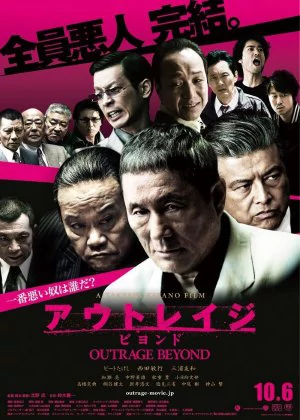Outrage: Beyond
After watching Takeshi Kitano's Outrage last week, I stepped into the sequel without any extra knowledge beyond what the first film had already revealed. A good thing as Outrage: Beyond [Autoreiji: Biyondo] has quite a few interesting twists that are easily spoiled by whatever promo material you happen upon. My advise: go in as unspoiled as possible and let the film itself do all the hard work. I'm sure you'll be aptly rewarded by the time Kitano played his last trick.

Outrage: Beyond marks the very first time that Kitano (Hana-Bi, Kikujiro no Natsu, Dolls, Takeshis', Kantoku: Banzai!, Achilles to Kame) directs a sequel to one of his own films. Outrage: Beyond might not be a direct sequel (there is a five year gap in the story that is only referenced), but the film does continue in the same setting with the same group of characters, it's just not a straight continuation of the first film.
There is a slight shift in focus though. Where the first film shunned individual character depth in favor of exploring the group dynamic, this second part tries to find the middle ground between these two sides, making it a slightly more accessible film altogether while keeping true to the bottom line of the first film. This time around it's clearer who the main characters are, even when the film itself still very much revolves around the every-changing dynamics inside the yakuza clan.
This time around the Sanno clan is also fighting some outside forces. It turns out the police is playing a highly tactical game, trying to control the size of the Sanno clan by introducing a third party: the Hanabishi clan. Kataoka acts as chess master and plays a vital part in this setup, bringing everyone together and setting the stage for a showdown that will yield control back to the police force. Meanwhile the Sanno clan is also struggling with internal reforms as the younger yakuza are taking over, pushing out the old members together with their values.

Visually Outrage: Beyond is on pretty much on par with its predecessor. Kitano doesn't change much of the film's style, which is still dominated by cold blues and hazy browns. The editing is, as always, razor sharp, the film in its entirety looks slick and stylish, I just felt that the first Outrage had some nicer visuals tricks to balance out the colder undercurrent. While Outrage: Beyond has its moments, they don't tend to stick out as much.
The soundtrack is an even subtler affair than it was the first time around. Once again, when you listen really closely you'll uncover a strong and moody set of guitar-based, almost soundscape-like tracks, but Kitano obviously favors the cranky and smoky yakuza dialogues that dominate the film. It's a bold stylistic choice for someone who used to rely on the outspoken and memorable scores of Hisaishi, but it does pay off here.
Kitano killed off a lot of the cast in the first film so there aren't too many familiar faces here. I can reveal that Kitano himself returns as an actor, though I won't say in what form as that would be spoiling the fun. Ryo Kase gets a lot more screen time this time around, Shun Sugata, Fumiyo Kohinata and Ken Mitsuishi have strong supporting roles, while Yutaka Matsushige is one of the most notable secondary characters. All in all, Kitano once again assembled a splendid cast.

Even though a third film hasn't been announced yet, Outrage: Beyond looks and feels like the middle part of a trilogy. While Kitano could just as well end the Outrage series right now, I think he'd be making a big mistake. After all the shifts and twists in Outrage: Beyond all the pawns are in place for a sprawling finale, settling the Sanno dispute once and for all.
Outrage: Beyond falls just a little short of its predecessor. Because of the fact that it feels like the middle section of a full-blown trilogy the ending isn't as convincing as it could've been. Outrage: Beyond is dialogue-heavy and even though there are still some pretty violent scenes, even those are toned down compared to the first film. Still, Kitano delivers a quality Yakuza epic that could just as well the start of a sprawling third act.
